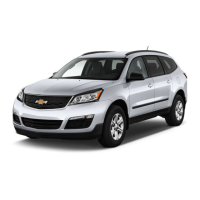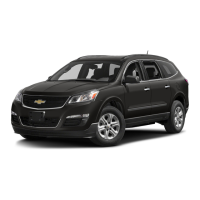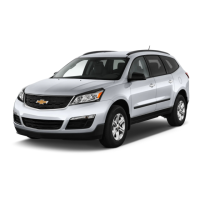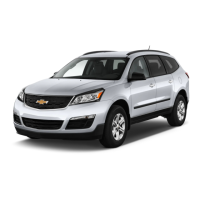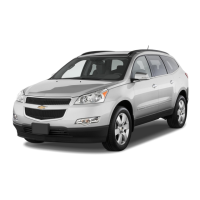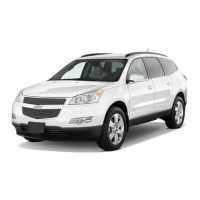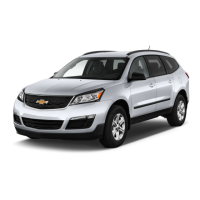Do you have a question about the Chevrolet Traverse 2018 and is the answer not in the manual?
Guidance on how to quickly locate information in the manual using the index.
Explanation of hazard messages and symbols used in the manual for safety.
Explanation of symbols used on vehicle components and labels.
Chart of additional symbols found on the vehicle and their meanings.
Overview of the instrument panel layout and its controls.
Brief overview of important features for initial driving.
Details on various vehicle features including infotainment and driver assistance.
Information on traction control, stability control, and tire pressure monitoring.
Information on keys and locking mechanisms for vehicle access.
Details about the vehicle's key and warnings related to its use.
Explanation of the RKE system's operation and range.
Instructions on operating the liftgate, including manual and power functions.
How to lock and unlock vehicle doors from inside and outside.
Information on power windows, window lockout, and express movement.
Proper adjustment and function of head restraints for occupant safety.
Details on adjusting manual and power front seats, including lumbar support.
Information on rear seat adjustment, folding, and heated features.
Proper use of seat belts, why they work, and safety warnings.
Guidelines for securing older children, infants, and young children.
Overview of various storage locations within the vehicle.
Details on storage areas located within the instrument panel.
Instructions on how to open and use the glove box.
Information on the center console storage, including its organizer and USB ports.
Details on extra storage features like the cargo management system.
Information on the use and installation of roof rack systems.
Overview of vehicle controls including steering wheel, wipers, and climate.
How to adjust the steering wheel for tilt and telescope positions.
Functions of buttons on the steering wheel for audio, phone, and cruise control.
Instructions on how to turn the heated steering wheel on and off.
Operation of windshield wipers and washers, including speed and fluid spray.
Explanation of various warning lights and gauges on the instrument cluster.
Diagram and explanation of the vehicle's instrument cluster.
Details on information displays like DIC, vehicle messages, and personalization.
How to navigate and use the Driver Information Center (DIC) and its pages.
Controls and operation of exterior lamps, including headlamps and parking lamps.
How to use the exterior lamp control dial for various lighting modes.
Procedure for switching between high and low beam headlamps.
Conditions under which Daytime Running Lamps (DRL) operate.
How the automatic headlamp system activates and deactivates based on lighting.
How to activate and deactivate hazard warning flashers.
Operation of turn signals and lane-change signals.
Conditions and procedures for turning on fog lamps.
Controls and operation of interior lighting, including dome and reading lamps.
How to adjust the brightness of the instrument panel and other controls.
Overview of the infotainment system, including warnings about distracted driving.
General information about the infotainment system's features.
Description of the electronic security system installed to prevent theft.
Description of the infotainment system's main screen and controls.
Information on Bluetooth connectivity, pairing, and hands-free phone operation.
General overview of Bluetooth system capabilities and limitations.
How to connect and use Apple CarPlay and Android Auto features.
General information and controls for operating the Hands-Free Phone system.
Overview of the climate control system and its functions.
How to control heating, cooling, and ventilation for driver and passenger.
Instructions on using air vent sliders to direct airflow.
Information on maintaining the climate control system, including the air filter.
Guidance on safe driving practices, including distracted driving and defensive driving.
Tips to avoid distractions and maintain focus on driving.
Principles of defensive driving, including expecting the unexpected and wearing seat belts.
Information on the dangers and consequences of drinking and driving.
Tips and techniques for effective braking, including reaction time and distance.
Details on electric power steering and steering in emergencies.
Tips for recovering the vehicle when it drops off the edge of the road.
Understanding and handling skidding situations.
Advice for driving safely on wet roads, including hydroplaning and other weather tips.
Tips for driving in snow and ice conditions, including slippery road driving.
Procedures for freeing a vehicle that is stuck in mud, sand, ice, or snow.
Understanding vehicle capacity weight and its impact on handling and safety.
Information on new vehicle break-in, ignition positions, and starting the engine.
Operation of the automatic transmission, including drive gears and parking.
Explanation of Electronic Range Select (ERS) mode for transmission control.
Information on operating the All-Wheel Drive (AWD) mode and its benefits.
How to use cruise control, including setting speed, resuming, and disengaging.
Features and operation of Adaptive Cruise Control (ACC) for maintaining speed and gap.
Overview of systems designed to help avoid crashes or reduce damage.
Details on Rear Vision Camera, Parking Assist, Surround Vision, and RCTA.
How FCA helps avoid or reduce harm from front-end crashes.
FAB feature for avoiding or reducing harm from crashes with pedestrians.
FPB system to help avoid or reduce harm from front-end crashes with pedestrians.
General information on vehicle care, service, and parts needs.
Warning regarding chemicals in vehicles that may cause cancer or reproductive harm.
Impact of non-dealer accessories and modifications on vehicle performance and safety.
Guidance on performing your own service work on the vehicle.
Instructions on how to open and close the vehicle's hood.
Steps for ensuring proper engine performance and longevity through oil maintenance.
Information on the cooling system and how to check and add coolant.
Details on brake pad wear indicators, brake squeal, and brake pedal travel.
Information about the original equipment maintenance-free 12-volt AGM battery.
Guidelines and warnings regarding the use of tire chains on the vehicle.
Step-by-step instructions for removing a flat tire and installing a spare tire.
Important warnings and limitations for using a compact spare tire.
Safety steps for jump starting a vehicle with a discharged battery.
Guidelines and cautions for towing a disabled vehicle correctly.
Recommendations for cleaning and protecting the vehicle's exterior and interior.
Information on tires, including maintenance, types, and sidewall labeling.
Explanation of the useful information molded into a tire's sidewall.
Overview of required vehicle maintenance and its importance.
Schedule for owner checks and required services based on mileage.
Services for specific applications like severe commercial use and underbody flushing.
Recommendations for additional services to maintain vehicle performance and avoid repairs.
List of recommended fluids, lubricants, and replacement parts for the vehicle.
Part numbers for common replacement items like filters, spark plugs, and wiper blades.
A log to record scheduled services, dates, and odometer readings.
Information on identifying the vehicle's VIN, model, paint, and production options.
Location and significance of the Vehicle Identification Number (VIN).
Explanation of the VIN's eighth character as the engine code.
Location and information contained on the service parts identification label.
Overview of vehicle data including capacities and specifications.
Approximate capacities for vehicle fluids and systems in metric and English.
Diagrams showing the drive belt routing for different engine types.
Steps to follow if a concern is not resolved with the dealership.
How to report safety defects to government agencies and General Motors.
Information on vehicle computers, event data recorders, and privacy.
Overview of OnStar services, system requirements, and additional information.
Information regarding the infotainment system, navigation, and stored data.
Description of the comprehensive in-vehicle system and its connectivity requirements.
Details on Emergency, Security, Navigation, Connections, and Diagnostics services.
Information on accessing Emergency Services via OnStar.
OnStar services related to stolen vehicles, remote ignition block, and slowdown.
How to use OnStar navigation, including Turn-by-Turn directions.
Information on staying connected via Wi-Fi hotspot and managing security settings.
How OnStar Advanced Diagnostics helps monitor vehicle systems and maintenance needs.
Details on OnStar Smart Driver and vehicle software updates.
| Brand | Chevrolet |
|---|---|
| Model | Traverse 2018 |
| Category | Automobile |
| Language | English |



